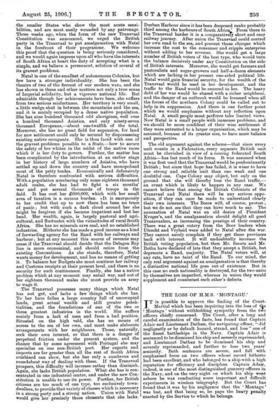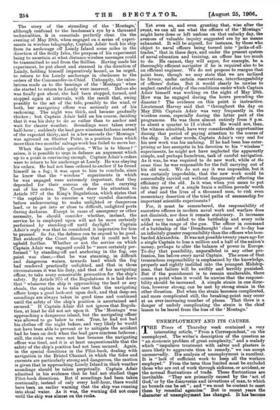THE LOSS OF H.M.S. MONTAGU.'
T T is possible to approve the finding of the Court- - Martial which has been inquiring into the loss of tile ' Montagu ' without withholding sympathy from the two officers chiefly concerned. The Court, after a long and careful examination of the facts, has found that Captain Adair and Lieutenant Dalian, the navigating officer, "did negligently or by default hazard, strand, and lose" one of the finest battleships in the Navy. Captain Adair is sentenced to be dismissed his ship and severely reprimanded, and Lieutenant Dathan to be dismissed his ship and severely reprimanded, and further to lose two years' .seniority. Both sentences are severe, and fall with emphasised force on two officers whose record hitherto bad been excellent, and who belonged to a ship with a high reputation for efficiency and discipline. Captain Adair, indeed, is one of the most distinguished gunnery officers in the Navy, and on the very night on which his ship weFt ashore he was conducting some important and difficult experiments in wireless telegraphy. But the Court has found. that it was by his negligence that the 'Montagu' was lost, and that being so, he pays the heavy penalty exacted by the Service to which he belongs. The story , of the stranding of the Montagu,' although confused to the landsman's eye by a thousand technicalities, it in essentials. perfectly clear. On the evening of May 29th, when engaged on a series of experi- ments in wireless telegraphy, Captain Adair took his ship from its anchorage off Lundy. Island some miles in the direction of the Scilly Isles, the purpose of his experiment being to ascertainat what distance wireless messages could be transmitted to and from the Scillies. Having made his experiment, he put about and steamed in the direction of Lundy, holding himself imperatively bound, as he urged, to return to his Lundy anchorage in obedience to the orders of the Commander-in-Chief. Unhappily, the calcu- lations made as to the bearings of the 'Montagu' when she started to return to Lundy were incorrect. Before she was finally put about, she had been stopped, turned, and slopped again at intervals, with the result that, owing possibly to the set of the tide, possibly to the wind, or both, her navigating officer was seriously out of his reckoning. The night was thick, and became gradually thicker.; but Captain Adair held on his course, deciding that it was his duty to do so rather than to anchor and wait for clearer . weather. Soundings were taken every half-hour ; suddenly the lead gave nineteen fathoms instead of the expected thirty, and in a few seconds the Montagu' was aground on Shutter Point, in a position from which more than two months' salvage work has failed to move her.
When the inevitable question, "Who is to blame ? " arises, it is possible to urge in defence an argument which up to a point is convincing enough. Captain Adair's orders were to return to his anchorage at Lundy. He was obeying his orders. He had not been ordered to anchor if he found himself in a fog ; it was open to him to conclude, since he knew that the " wireless " experiments in which he was engaged were extremely important, that they depended for their success on the exact carrying out of his orders. The Court drew his attention to Article 977 of the King's Regulations, which states that "the captain is to exercise a very careful discretion before endeavouring to make unlighted or dangerous land, or to get into or close to difficult, unlighted ports during darkness. Except in cases of emergency or other necessity, he should consider whether, instead, the service he is employed upon will not be more certainly performed by standing-off until daylight." Captain Adair's reply was that he considered it imperative for him to proceed. So far, the defence can be argued to be good. But evidently the Court thought that it could not be upheld further. Whether or not the service on which Captain Adair was engaged could be "more certainly per- formed" by standing-off and anchoring in the fog, one point was clear,---that he was steaming, in difficult and dangerous waters, towards land which the fog had rendered practically unlighted, and that in those circumstances it was his duty, and that of his navigating officer, to take every conceivable precaution for the ship's safety. By Article 975 of the Regulations it is laid down that "whenever the ship is approaching the land. or any shoals, the captain is to take care that the navigating officer keeps a good look-out upon deck, and that deep-sea soundings are always taken in good time and continued until the safety of the ship's position is ascertained and secured." If Captain Adair, did not ignore that Regula- tion, at least he did not act upon it. The 'Montagu' was approaching a dangerous island, but the navigating officer was allowed to go below to rest. True, he had not had his clothes off the night before, and. very likely he would not have been able to prevent or to mitigate the accident had he been on deck when the lead gave nineteen fathoms ; still, the risks run were not less because the navigating officer was tired, and it is at least unquestionable that the safety of the ship's position had not been secured. Again, in the special directions in the Pilot-book, dealing witl; navigation in the Bristol Channel, in which the tides and currents are particularly strong and dangerous, the caution is given that in approaching Lundy Island in thick weather soundings should be taken perpetually. Captain Adair admitted in his evidence that he had not studied thee Pilot-book directions. But if soundings had been taken continually, instead of only every half-hour, there would have been an earlier warning that the ship was running into shoal water. As it was, the warning did not come until the ship was almost on the racks. Yet even so, and even granting that, wise after the event, we can all see what the officers of the ' Montagu ' might have done or left undone on that unlucky day, the avenues of valuable inquiry suggested are by no means exhausted. It will be argued, for instance, by those who object to naval officers being turned into " jacks-of-all- trades," that in these days, and under the present system of naval education and training, an officer has too much to do. He cannot, they will argue, for example, be a thoroughly efficient navigator if he is required also to be an efficient engineer. We do not propose to reargue that point here, though we may state that we are inclined to favour, under certain reservations, interchangeability of officers' duties. But it would clearly be unwise to neglect careful study of the conditions under which Captain Adair himself was working on the night of May 29th. How was he engaged during the hours preceding the 'disaster ? The evidence on this point is instructive. Lieutenant Harvey said that "throughout the day on May 29th Captain Adair was very frequently in the Wireless room, especially during the latter part of the programme. He was there almost entirely from 8 p.m. to about a quarter to 11 o'clock." He would not, then, the witness admitted, have very considerable opportunities during that period of paying attention to the course of the ship. In other words, Captain Adair's very zeal for his new work was his undoing. If he had been less enter- prising or less energetic in his devotion to his " wireless " experiments, he might not have neglected the apparently simple, and perhaps humdrum, task of careful navigation. As it was, he was required to do new work, while at the same time he was responsible for the full carrying out of his old work. We do not say it was impossible, but it was certainly improbable, that the new work could be successfully carried out without dangerously affecting the efficiency of the old. Is it wise, when you mean to put into the power of a single brain a million pounds' worth of steel and the lives of a thousand men, to risk even momentary desertion of the tried paths of seamanship for important scientific experiments ?
For, it must be remembered, the responsibility of executive officers in modern naval work and warfare does not diminish, nor does it remain stationary. It increases with every ton added to the battleship and every mile added to the range of the gun. The officer in command of a battleship of the 'Dreadnought' class of to-day has an infinitely greater responsibility than the officers who bom- barded Alexandria. It was not possible twenty years ago for a single Captain to lose a million and a half of the nation's money, perhaps to alter the balance of power in Europe., To-day that possibility, unparalleled in any other pro- fession, lies before every naval Captain. The sense of that tremendous responsibility is emphasised by the knowledge, properly and rightly instilled into the youngest Midship- man, that failure will be swiftly and terribly punished. But if the punishment is to remain unalterable, there comes a point when it would be unwise that the responsi- bility should be increased. A simple strain in one direc- tion, however strong, can be met by strong strain in the other direotion. But when the strain becomes complicated, and more complicated still, the breaking-point may occur at an ever-increasing number of places. That there is a danger of unduly complicating the strain is the chief lesson to be learnt from the loss of the Montagu.'



































 Previous page
Previous page